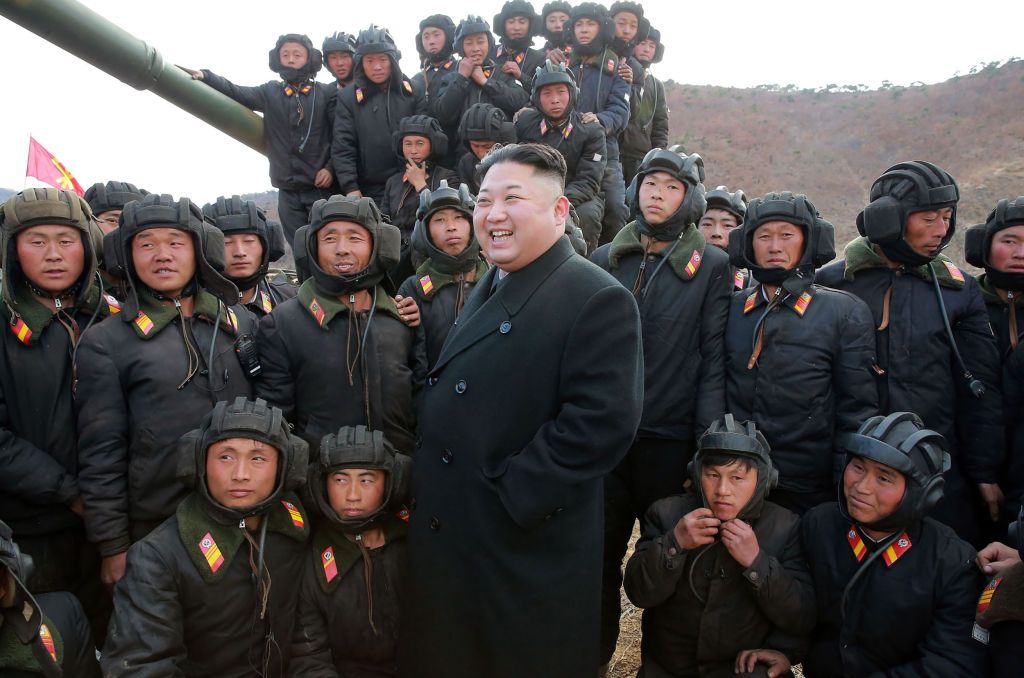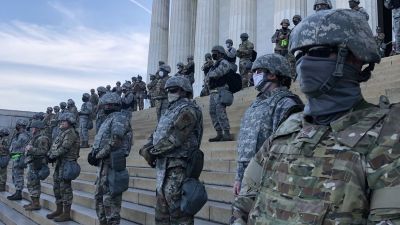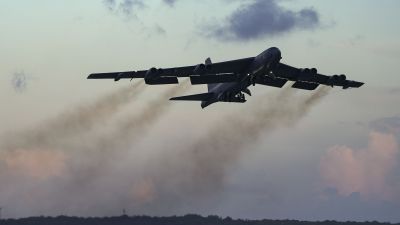
North Korean leader Kim Jong Un inspecting the Korean People's Army Tank Crews' Competition-2017 at an undisclosed location. (Photo by STR/AFP/Getty Images)
There is no saner, seasoned or sensible voice on American foreign policy today than Andrew Bacevich. He graduated from West Point and served in Vietnam, earned his doctorate in diplomatic history from Princeton University, taught history and international relations at Boston University, and has written several acclaimed books, including the best-selling Washington Rules: America’s Path to Permanent War and more recently, America’s War for the Greater Middle East. He contributes essays and articles to a wide variety of publications and is writer at large for The American Conservative.
Bill Moyers: The rhetoric between Donald Trump and Kim Jong Un gets hotter and more belligerent — it’s incendiary and personal. When’s the last time you heard this kind of vitriolic, threatening rhetoric between a US president and a head of another country?
Andrew Bacevich: I don’t believe that we’ve ever had a president who has used this kind of language. Certainly not in my lifetime. One of the things that strikes me about President Trump is that his capacity to use the English language is so stunted. He simply has no ability to adapt the language he uses to a particular circumstance. In the past when presidents are out campaigning, they use one kind of language, a different kind of language when they’re speaking to a joint session of Congress, [and] a different kind of language when they’re meeting with a foreign dignitary. But [with] Trump, it’s all the same. It’s all crude. It’s all unsophisticated. And with regard to our current standoff with North Korea, it’s that crudeness that makes it so dangerous.
Moyers: What’s your take on the rhetoric coming out of North Korea — and in particular from Kim Jong Un and the foreign minister, who seems to have taken Donald Trump literally?
Bacevich: It’s not unprecedented. North Korean language over decades has tended to be provocative. That said, previous administrations have tended to discount North Korean language — not to ignore it, but to not take it quite so literally as Trump seems to. That tendency to discount has served us well in the past. Part of the thing we have to keep in mind is — and I expect this is true with regard to North Korea, and I know it’s true with regard to the United States — is that a leader speaks to multiple audiences. Any sophisticated politician appreciates that and tries to frame a statement so that it will be understood and presumably [be] correctly perceived by multiple audiences. But these two guys seem to not understand that political requirement. To some degree, I think Trump mostly speaks to himself. He says things in a way that somehow satisfies his own sense of who he imagines himself to be as a leader. He certainly doesn’t take into account the fact that American allies as well as adversaries are taking in his every word and trying to interpret them.
Moyers: Given the nature of his rhetoric, given his known temperament, does North Korea have to worry that Trump just might order an attack for whatever reason?
Bacevich: If I were a North Korean who was advising Kim Jong Un — I’d be counseling my boss that we’re dealing with somebody who could easily fly off the handle and make an impulsive decision. Kim Jong Un might say to me, “Well, why do you think that?” and I’d say, well, let’s consider the attack on Syria that followed the allegations, probably true allegations, of Syrians using chemical weapons. That was a decision made off the cuff, impulsively, with no particular connection to larger policy purposes. From a North Korean perspective, I would take that episode quite seriously.
Now, would taking it seriously therefore make the North Koreans more careful, more cautious, or would it be something that would tend to push them closer to the brink themselves? I don’t know. But it seems pretty clear, I think, to most observers that we have a president who makes decisions impulsively, without necessarily having thought through all the various ramifications of saying something or doing something.
Moyers: Kim Jong Un must have seen what happened to Saddam Hussein in Iraq and Moammar Gadhafi in Libya. Do you think it’s possible that he believes the US wants to do him in as well, and that if Hussein and Gadhafi had had some nuclear weapons, they might still be around? Do you think this might cross his mind?
Bacevich: Oh, absolutely. The recent language by the Trump administration — they revived the phrase “rogue regime” — seems to recall the kind of language that was much in evidence in the George W. Bush administration after 9/11. Remember, North Korea was part of the “axis of evil.” After 9/11, if you were on the “axis of evil,” it seemed pretty clear that the United States was going to come after you. In that post-9/11 period, Gadhafi in Libya, perhaps taking seriously the possibility that he was going to be somewhere on the hit list, made a point of giving up his nuclear weapons program. From what we know, it wasn’t a very impressive program, but he gave it up and his reward then was to be attacked and overthrown by the Obama administration.
I’m in the camp that believes we cannot know for certain how the North Koreans think, and we cannot know for certain what their purposes are. But I’m in the camp that believes that as vicious, as oppressive as that regime is, nonetheless there is a rational basis for the things that they do, and that Kim Jong Un’s ultimate objective is to maintain his regime, and by extension, to maintain himself. I also believe that they are likely to appreciate that they are in a position of extraordinary weakness relative to us, relative to almost any other nation in the world. Weak economically, weak militarily, weak in terms of their capacity to innovate, to adjust, to improve their situation. And it makes sense from that perspective to see nuclear weapons, particularly nuclear weapons along with some kind of a long-range ballistic missile capability as a lifeline. I think that that’s their purpose, to be seen to be developing this capability in order to try to keep us at arm’s length and to keep China as their only serious ally.
Moyers: We don’t have many historians of North Korea, but one of them, Cheehyung Harrison Kim, teaches the history of Korea at the University of Hawaii. He says, and I’m quoting him: “The nuclear threat as a real war is not real. North Korea is using the nuclear weapons to stand up to the US and South Korea, and to send a message to the world that it will bend to no one. North Korea sees nuclear weapons as one definitive way to gain international attention and be heard, and it sees nuclear energy as a solution to its energy problem.” Make any sense to you?
Bacevich: It makes great sense to me. I would add this: Without claiming any great knowledge of the North Korean domestic situation, from Kim Jong Un’s point of view, such posturing could be useful in maintaining discipline in North Korean society. It would be a way of trying to rally national cohesion and keep at bay any internal adversaries that Kim Jong Un might worry about. And any dictator of his type is going to be constantly weary of the possibility of internal opposition.
Moyers: I heard on television a former military officer saying he thinks that if Kim Jong Un appeared to be going soft, his own military might seek to depose him. Does that make sense to you from what you know about the Korean military?
Bacevich: I don’t know much about them myself, but it makes a lot of sense. I think this is standard behavior by autocratic regimes, to try to maintain domestic cohesion by claiming that the outside world consists entirely of enemies.
Moyers: As dreadful as it is to even ask it, what might lead either Trump or Kim Jong Un over the tipping point — to start a war?
Bacevich: If one side takes the other side’s rhetoric as literally true. If on either side, the central figures get up in the morning and say, “We believe that the other side is going to attack within the next 24 hours,” that can then lead to a decision, “Well, I guess then we should pre-empt.” I think that’s the great danger. Meaning not so much war by calculation, but war by miscalculation and misunderstanding.
Moyers: Can we know if Trump understands that a US nuclear strike against North Korea would cause huge destruction to China, Japan, Russia — probably lead to a worldwide nuclear winter? Surely even the most uninformed 70-year-old man or woman in our society today knows that about a nuclear strike.
Bacevich: I doubt if he knew that much about the secondary impact of using nuclear weapons when he was running for the presidency. You have to think that at this point, people like Gen. McMaster and Gen. Kelly and Gen. Mattis would have had some opportunity on a face-to-face basis to say, “Mr. President, here is what we think would occur were there to be an actual use of nuclear weapons.” You have to think somebody has spoken to him. But with this president, you don’t know what sinks in. Just look at his use of rhetoric — “fire and fury like the world has never seen.”
That language is so over the top that it seemed to suggest that at that moment, either he didn’t have any understanding of what the use of nuclear weapons would produce or simply didn’t care. I think that’s why so many of us were taken aback by that kind of language. And the way you asked the question, does he understand — even if it is possible to make an argument that a fairly precise nuclear attack could eliminate the regime in Pyongyang — does he have any understanding of the secondary implications? Does he understand that we would have once more taken the nuclear genie out of the bottle and reintroduced it as an actual instrument of international politics? Does he have any understanding of the effects on neighboring countries — including our ally South Korea, and China, which is somewhere between trading partner and adversary, but certainly a country of enormous importance to our own well-being and to the well-being of the world? You don’t get a sense that he’s able to think through the subsequent effects and that’s disturbing.
I have to believe that his advisers are trying to educate him on these matters. But he doesn’t seem to be terribly educable.
Moyers: You mentioned three of the military men who are advising him. You are an experienced military officer in your own right. What kind of burden does this put on them?
Bacevich: I think I’ve met Mattis once. I’ve met McMaster once. I don’t believe I’ve ever met Gen. Kelly. I do not know any of them well. All three of them are highly regarded in military circles, I think more broadly in national security circles. I don’t think any of them are fools. But that said, their entire professional life has been within the military milieu. They have been brought up to think in terms of hard power. That doesn’t mean they’re warmongers. I’m quite certain that none of the three is a warmonger. But I tend to think that because of their upbringing and professional experience, there’s not a lot of creativity and imagination there. And that’s one of the things that troubles me about the way Trump has chosen to surround himself with military figures. Of course, our secretary of state is not a military figure, but he doesn’t seem to wield all that much influence, doesn’t seem to be particularly energetic. And so almost by default, it appears the military figures are the ones that would seem to exercise the greatest influence over the president.
Moyers: Think on this for a moment. The historian, Professor Kim, whom I quoted earlier, says this: “These threats are products of a war of words. As we all know this rhetoric well, it’s a battle of language. And the fight with words does matter. This is how governments gauge each other and how militaries create plans and prepare to respond. Militaries all over the world live for moments like this. They need such battles of words because this is what makes militaries move and how militaries justify themselves. This is no different in the US and North Korea. The militaries of the two countries are relatively enormous and their economies involve millions of people. The military industrial complex in the US needs constant threats from the North Koreans to do what it does and prepare for the future. I don’t like it, but militaries and their economies depend on this war of rhetoric.” What do you think of that?
Bacevich: I think that’s overstated. But it’s not entirely incorrect. What the military industrial complex requires and what military institutions tend to favor is a world in which the potential for conflict is always present and in which there are national security threats for which maintaining military power offers the only plausible response. But neither the military industrial complex nor the military requires constant war scares. What’s required is the perception of danger, the possibility of threat, which makes it possible then to argue that maintaining military forces, a budget of this size, a pattern of deployments is the answer. And with that, they can maintain the sort of arrangements that, sadly, we Americans have come to simply take for granted over the past several decades.
Moyers: Which is…?
Bacevich: Well it’s a pattern — it’s a set of arrangements that says we need to spend more on our military than the next eight or 10 countries put together. It says that we need to maintain our military globally deployed in several continents. It’s says that we need to be engaged in this so-called war on terrorism that has been going on now for 16 years without any success in sight. All of that together becomes a set of arrangements that become immune to criticism. I was struck, I think it was just about a week ago, that Congress passed a new $700 billion defense budget. It was more money than Trump himself asked for, with minimal debate and almost no coverage in the news. It’s just one of those things we do every year, pass this massive military budget.
Moyers: It seems to have been normalized. It doesn’t create much reaction.
Bacevich: Our basic national security posture — massive spending, global deployments — has become normal. Worse, the actual engagement in hostilities has become normal. I’m referring here to Afghanistan and Iraq and Somalia, large parts of Africa — just in the past week we had another airstrike in Libya. That’s normal as well.
Moyers: Little attention is paid to it by the press or by the public, right?
Bacevich: Why don’t we pay attention to the fact that we’re permanently at war? Well, at the present moment, US casualties are down because we’ve learned to use contractors and proxies and rely on airpower. The amount of money that we are spending, and I think wasting, gets little attention. I recall a speech by President Eisenhower — I think it was in 1953 or 1954, when he was making the point about opportunity costs. He said in effect, every dollar we spend on our military means one less dollar that goes to education, that goes to health care, that goes to other things that the country needs. There’s no awareness of opportunity costs today with regard to our military spending. The only time we notice what’s going on is when we do have some sort of a war scare such as we’re having right now with North Korea. Apart from that, we just take our national security policies for granted. There’s no accountability. There’s no scrutiny. There’s no serious debate. I think it’s one more indicator of how bankrupt our politics have become. These are things that aren’t even considered worth discussing.
Moyers: Let me go back to North Korea and the US for a moment. Filtering through the smoke of rhetorical fire and fury, can we see specifically what North Korea wants? Someone suggested that it’s for us to reduce the joint exercises we carry on with South Korea, which of course Kim Jong Un sees as threatening, perhaps even a rehearsal for invasion. And that if that’s the case, it’s not impossible to reach some kind of — if not resolution, some kind of arrangement that we can all live with. Is that romantic to think that?
Bacevich: I don’t think so. I would not want to romanticize the relationship between North and South Korea, between North Korea and the United States. But the fact is we’ve maintained the status quo on the Korean Peninsula without war since 1953. It seems to me from the point of view of the United States, and I suspect of South Korea and Japan and probably China as well, that’s what we want, to maintain the status quo. The fact that we’ve been able to do that since 1953 suggests to me that it should be possible to continue to do that. If you set aside the irresponsible rhetoric, I don’t see that there are any facts that would render the status quo of the past several decades obsolete.
Moyers: The US wants North Korea to halt its nuclear program. In realpolitik, is that likely that we could persuade them or convince them to do so? We’ve already offered them money for disarmament and they rejected that. So is this wishful thinking on the US’ part?
Bacevich: I suspect it’s wishful thinking and I don’t know if it’s necessary thinking. Again, my view is based on the conviction that at the end of the day the North Korean regime is rational and aims above all to preserve itself. And if that assumption is correct — and I have to emphasize it’s an assumption — then they should be deterrable.
Now in that context, the ongoing situation with regard to United States and Iran is not irrelevant. When the Obama administration succeeded in negotiating the Iran nuclear deal, that was with an expectation on the part of Iran that suspending their effort or reducing it in scale, would provide benefits to Iran. To the extent that the Trump administration is now making all kinds of noises about wishing to pull out of that deal or somehow overturn it, that would suggest to the North Koreans that making any kind of agreement with regard to nuclear weapons is something the Americans might change their minds about, and therefore that becomes an obstacle to any sort of negotiations.
Moyers: It also strikes me, however, that whereas Iran agreed for certain concessions in exchange for putting its nuclear program aside, we can’t expect any pause in testing with North Korea until Kim Jong Un is certain that he has a nuclear weapon that could be loaded on a long-range missile. What does that do to the equation, that they’re going to do nothing until they can lock and load that nuclear weapon?
Bacevich: You may be right. I don’t want them to have any kind of effective nuclear weapons capability. But absent military action to prevent them from continuing their missile development program — and I think preventative military action on our part would be foolhardy in the extreme — they’re probably going to develop a missile and a warhead that can be married together and be used. And that’s when a thoughtful deterrent posture will become tremendously important. If we go back to the early stages of the Cold War, of course, we for a time had a nuclear monopoly. The Soviets tested their first bomb in August of 1949. There were those in American political circles and I believe in American military circles who said at the time that we needed to attack the Soviets while we still had a very significant nuclear advantage. Cooler heads prevailed. We adopted a posture of deterrents vis-à-vis the Soviet Union, and that worked. I mean, we came damn close in October of 1962, but nonetheless, a posture of deterrents was successful in preventing nuclear war between the United States and the Soviet Union. I don’t believe that that success should be discounted as we think about how to deal with the North Korean nuclear threat.
Moyers: Agreed. It’s possible to describe a foreign government as an evil empire and still come to terms with it on a peaceful basis. Ronald Reagan showed us that with Mikhail Gorbachev.
Bacevich: Yes he did. He absolutely did.
Moyers: So what do you hope for? What should be our objective?
Bacevich: Well, in the near term, I think our aim is to try to maintain stability in the region, meet our commitments to our allies, especially South Korea and Japan, and avoid war — particularly avoid any war that involves the use of nuclear weapons whether by them or by us. And so to my mind, we need to ratchet down the rhetoric. We need to put in place the basis of a strategy of deterrents that accepts the fact that the North Koreans are going to have a nuclear capability. Then I think we need to look beyond the North Korean problem to appreciate that the Korean crisis is happening in a broader regional context. That context is that the regional distribution of power that existed as a result of World War II in which the United States enjoyed clear-cut primacy — that’s ended. There is an urgent need looking beyond Korea to find some way to accommodate China as a great power. There needs to be some kind of a power sharing or balance of power or mutual accommodation that allows the United States, China, Japan, South Korea and others to mutually coexist. I wouldn’t for a second suggest that this is something that can be done in a week and a half, but I think if we can sort that out then in a sense the North Korean issue will almost take care of itself. But the overarching question of how to accommodate China as a great power seems to be to be actually of greater importance than any threat posed by North Korea today or in the near term.
Moyers: Which brings us full circle. Do you see anything in Donald Trump’s behavior or temperament that makes you think he can envision such a grand bargain and has the patience and skill to help bring it about?
Bacevich: No, sadly, none at all. Nor do I see any indication that his military advisers have the imagination to conceive of a post–Cold War world in which the United States is no longer the great global hegemon. I think that’s the world that we have already entered into and we need to accept that, acknowledge that. The foreign policy discussion these days is just so impoverished, so repetitive, so trapped in a vocabulary — “the indispensable nation, global leadership” — that is at odds with our reality. And sadly, we’ve got a president who I think is completely out of touch. I suppose we had a president once who had a different temperament. When Harry Truman became president [1945] he was not prepared for the office and probably had a fairly limited understanding of the intricacies of statecraft, but he proved to be a pretty quick learner. He also proved to be somebody who was coachable. Truman listened to what [Secretary of Defense] George C. Marshall had to say, listened to what [Secretary of State] Dean Atchison had to say. That may have been one of Harry Truman’s greatest virtues. Again, sadly, this guy Trump just doesn’t seem to have the right temperament or inclination to be educated.
Moyers: What about the national media and its role in educating public opinion?
Bacevich: I think there is a hysteria about Trump.
Moyers: In the media?
Bacevich: Yes, it’s not helpful. I mean, just in the last 48, 72 hours, as the news has been dominated by Donald Trump’s confrontation with the National Football League — and put me down, by the way, as being supportive of the players who take a knee. The obsession with Trump and everything that he says and everything that he does gets in the way of sober reporting about issues like the Korea crisis. To put it more bluntly, I think the media is guilty in this case of helping to promote the idea of imminent war in ways that are not helpful.




